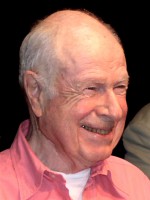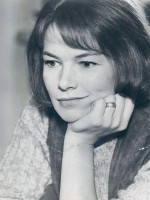The Benefit of the Doubt is a British film of genre Documentary with Peter Brook
The Benefit of the Doubt (1967)

If you like this film, let us know!
Benefit of the Doubt is a 1967 documentary on Peter Brook's anti-Vietnam protest play, with the Royal Shakespeare Company, known under the title US. It was filmed at London's Aldwych Theatre and features Peter Brook, Michael Kustow, Michael Williams and Glenda Jackson. It was directed by Peter Whitehead.
Peter Brook also adapted US as a film, Tell Me Lies, and this was released in 1968.
Actors
Comments
Leave comment :
Suggestions of similar film to The Benefit of the Doubt
There are 38 films with the same actors, 8962 with the same cinematographic genres, 8197 films with the same themes (including 867 films with the same 3 themes than The Benefit of the Doubt), to have finally 70 suggestions of similar films.If you liked The Benefit of the Doubt, you will probably like those similar films :
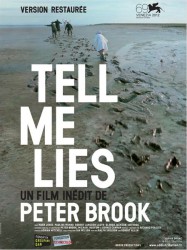
Tell Me Lies (1968)
Directed by Peter Brook
Genres Drama, Musical theatre, Documentary
Themes Politique, Political films
Actors Mark Jones, Henry Woolf, Glenda Jackson, Ian Hogg, Patrick Wymark, Eric Allan
Rating67%





A young couple, Bob Lloyd and Pauline Munro see a photo in a magazine of a baby mutilated by napalm and it changes their lives. They ask is London aware, is London concerned?

Marat/Sade (1967)
, 1h56Directed by Peter Brook
Origin United-kingdom
Genres Drama, Historical, Musical
Themes Films about writers, Political films, Films based on plays, French Revolution films
Actors Patrick Magee, Ian William Richardson, Michael Williams, Clifford Rose, Glenda Jackson, Freddie Jones
Rating74%





À l'asile de Charenton, le marquis de Sade met en scène une pièce sur la mort de Jean Paul Marat, en utilisant les patients comme acteurs.
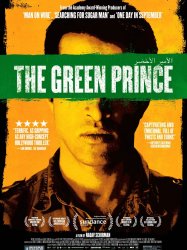
The Green Prince (2014)
, 1h41Genres Thriller, Documentary
Themes Films set in Africa, Films about religion, Documentary films about law, Documentary films about war, Documentary films about historical events, Documentary films about politics, Documentary films about religion, Political films, Films about Jews and Judaism
Rating71%





The film tells the story of Mosab, son of Hamas leader Sheikh Hassan Yousef, who for ten years was a spy for Israel's Shin Bet.

Poison Dust (2005)
, 1h24Origin USA
Genres Documentary
Themes Environmental films, Documentary films about environmental issues, Documentary films about war, Documentary films about historical events, Documentary films about nuclear technology, Documentaire sur une personnalité, Documentary films about health care, Documentary films about technology, Political films
Rating63%





Documentary about U.S. soldiers returning from Iraq who had been exposed to radioactive dust from dirty bombs when artillery shells coated with depleted uranium or DU are fired. Many suffer mysterious illnesses and have children with birth defects.

State of Fear (2006)
, 1h34Directed by Pamela Yates
Genres Documentary
Themes Films about terrorism, Documentary films about law, Documentary films about war, Documentary films about historical events, Documentary films about politics, Documentary films about terrorism, Political films
Rating73%





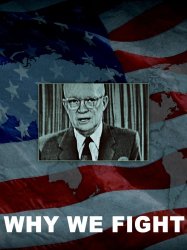
Why We Fight (2005)
, 1h38Directed by Eugene Jarecki
Genres Drama, Documentary, Historical
Themes Documentary films about war, Documentary films about historical events, Documentary films about politics, Political films
Actors Gore Vidal, Frank Capra
Rating79%





Why We Fight describes the rise and maintenance of the United States military–industrial complex and its 50-year involvement with the wars led by the United States to date, especially its 2003 Invasion of Iraq. The documentary asserts that in every decade since World War II, the American public was misled so that the government (incumbent Administration) could take them to war and fuel the military-industrial economy maintaining American political dominance in the world. Interviewed about this matter are politician John McCain, political scientist and former CIA analyst Chalmers Johnson, politician Richard Perle, neoconservative commentator William Kristol, writer Gore Vidal, and public policy expert Joseph Cirincione.
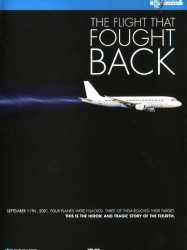
The Flight That Fought Back (2005)
, 1h30Origin USA
Genres Drama, Documentary
Themes Films based on the September 11 attacks, Films about religion, Films about terrorism, Transport films, Aviation films, Documentary films about law, Documentary films about war, Documentary films about historical events, Documentary films about politics, Documentary films about religion, Documentary films about technology, Documentary films about terrorism, Political films, Films about Islam, Disaster films, Films about aviation accidents or incidents, Films about hijackings
Actors Greg Benson, Pej Vahdat
Rating73%






Vietnam Nurses (2005)
, 52minutesGenres Documentary
Themes Documentary films about war, Documentary films about historical events, Documentary films about health care, Political films
Rating64%





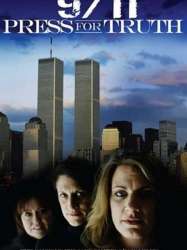
9/11: Press for Truth (2006)
, 1h25Origin USA
Genres Documentary
Themes Films based on the September 11 attacks, Films about religion, Films about terrorism, Transport films, Aviation films, Documentary films about law, Documentary films about war, Documentary films about historical events, Documentary films about politics, Documentary films about religion, Documentary films about technology, Documentary films about terrorism, Political films, Films about Islam, Dans un avion, Disaster films, Films about aviation accidents or incidents, Films about hijackings
Rating79%






Une Affaire de nègres (2009)
, 1h30Directed by Osvalde Lewat
Genres Documentary
Themes Films set in Africa, Documentary films about law, Documentary films about war, Documentary films about historical events, Documentaire sur une personnalité, Documentary films about politics, Political films
March 20, 2000, a decree by the President of the Republic of Cameroon set up an Operational Command Unit to tackle rampant banditry in the Douala region. The Unit introduced what amounted to round-ups: in one year, 1600 people disappeared or were killed. One year later, nine young men disappeared. The matter was submitted to the UN High Commissioner for Human Rights. The accused were found guilty of "failure to follow orders" and released but legal proceedings have not come to an end. The victims' families have to live between the desire for justice and the pressure for the crimes to be wiped out forever from the collective memory.
 Connection
Connection
